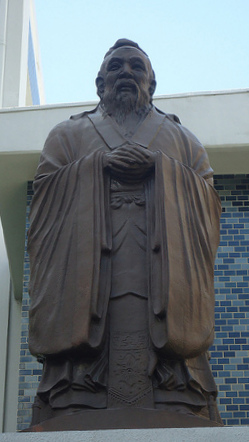Difference between revisions of "Confucius"
(Created page with "right|thumb|249px|Statue of Confucius on the former site of the [[Shiseibyo|Confucian temple in Kumemura, Naha, [[Okinawa prefecture|Okinaw...") |
|||
| Line 6: | Line 6: | ||
Kǒng Zǐ (lit. "Master Kǒng"), commonly known in English as Confucius, was a philosopher of ancient China. His teachings, collected into the [[Analects of Confucius]], along with the various forms of [[Confucianism]] and [[Neo-Confucianism]] they have inspired, have historically formed the core of political philosophy and moral education throughout East Asia. | Kǒng Zǐ (lit. "Master Kǒng"), commonly known in English as Confucius, was a philosopher of ancient China. His teachings, collected into the [[Analects of Confucius]], along with the various forms of [[Confucianism]] and [[Neo-Confucianism]] they have inspired, have historically formed the core of political philosophy and moral education throughout East Asia. | ||
| − | Originally from [[Qufu]] in what is today [[Shandong province]], Confucius is said to have pursued a career as a statesman, ultimately resigning when he found the task conflicted with his personal beliefs. He then traveled widely, accumulating followers and disciples, who after his death assembled his teachings into the Analects. | + | Originally from [[Qufu]] in what is today [[Shandong province]], Confucius likely came from a well-to-do family, since he is known to have been educated in writing, music, and rites. His father died when Confucius was quite young. He is said to have pursued a career as a statesman, ultimately resigning when he found the task conflicted with his personal beliefs. He then traveled widely, accumulating followers and disciples, who after his death assembled his teachings into the Analects. |
| − | Confucianism was made the official state philosophy of the [[Han Dynasty]] in 139 BCE | + | His teachings cannot be easily summarized in just one or two sentences, but can generally be said to be of a humanistic, or human-focused, nature. Confucius does not speak much about death, the spirit world, or the cosmos, but focuses on philosophies of upright behavior in everyday life and in actual society.<ref>Albert Craig, ''The Heritage of Chinese Civilization'', Third Edition, Prentice Hall (2011), 15-16.</ref> |
| + | |||
| + | Confucianism was violently suppressed under the [[Qin Shihuangdi|First Emperor of Qin]] (c. 210s BCE), but was revived and made the official state philosophy of the [[Han Dynasty]] in 139 BCE. In the centuries which followed, a number of Confucian temples were built. [[Emperor Taizong of Tang]] (r. [[626]]-[[649]]) later ordered that temples to Confucius be constructed in every major city in the empire. | ||
{{stub}} | {{stub}} | ||
| Line 14: | Line 16: | ||
==References== | ==References== | ||
*Pamphlet available at [[Shiseibyo|Kume Confucian temple]], Matsuyama Park, Naha, Okinawa, published by Kume Sôseikai. | *Pamphlet available at [[Shiseibyo|Kume Confucian temple]], Matsuyama Park, Naha, Okinawa, published by Kume Sôseikai. | ||
| + | <references/> | ||
[[Category:Jomon Period]] | [[Category:Jomon Period]] | ||
[[Category:Scholars and Philosophers]] | [[Category:Scholars and Philosophers]] | ||
Revision as of 13:51, 9 January 2014
- Born: 552 BCE
- Died: 479 BCE
- Chinese/Japanese: 孔子 (Kǒng Zǐ / Koushi)
Kǒng Zǐ (lit. "Master Kǒng"), commonly known in English as Confucius, was a philosopher of ancient China. His teachings, collected into the Analects of Confucius, along with the various forms of Confucianism and Neo-Confucianism they have inspired, have historically formed the core of political philosophy and moral education throughout East Asia.
Originally from Qufu in what is today Shandong province, Confucius likely came from a well-to-do family, since he is known to have been educated in writing, music, and rites. His father died when Confucius was quite young. He is said to have pursued a career as a statesman, ultimately resigning when he found the task conflicted with his personal beliefs. He then traveled widely, accumulating followers and disciples, who after his death assembled his teachings into the Analects.
His teachings cannot be easily summarized in just one or two sentences, but can generally be said to be of a humanistic, or human-focused, nature. Confucius does not speak much about death, the spirit world, or the cosmos, but focuses on philosophies of upright behavior in everyday life and in actual society.[1]
Confucianism was violently suppressed under the First Emperor of Qin (c. 210s BCE), but was revived and made the official state philosophy of the Han Dynasty in 139 BCE. In the centuries which followed, a number of Confucian temples were built. Emperor Taizong of Tang (r. 626-649) later ordered that temples to Confucius be constructed in every major city in the empire.
References
- Pamphlet available at Kume Confucian temple, Matsuyama Park, Naha, Okinawa, published by Kume Sôseikai.
- ↑ Albert Craig, The Heritage of Chinese Civilization, Third Edition, Prentice Hall (2011), 15-16.
